Spring 2023
Ester Caffarel-Salvador
Mytide Therapeutics
Gabrielle Fleming
Vertex Pharmaceuticals
Jordan Lewandowski
Flagship Pioneering
Spring 2021
Ester Caffarel-Salvador
Mytide Therapeutics
Mohsen Erfanzadeh
Massachusetts General Hospital
Fall 2020
Ester Caffarel-Salvador
Mytide Therapeutics
Margaret Thomas
Columbia University
Spring 2020
Nava Gharaei
Harvard University
Mathilde Bonnemaison
UMass Boston
Kaylee Wells
UMass Boston
Ester Caffarel-Salvador
Mytide Therapeutics
Fall 2019
Nava Gharaei
Harvard University
Kaylee Wells
UMass Boston
Shiran Ferber
MIT
Ester Caffarel-Salvador
Mytide Therapeutics
Spring 2019
Amanda Bolgioni
Boston University
Ester Caffarel-Salvador
MIT
Shiran Ferber
MIT
Bahar Rahsepar
Boston University
Fall 2018
Amanda Bolgioni
Boston University
Ester Caffarel-Salvador
MIT
Scott Greenwald
Massachusetts Eye and Ear
Bahar Rahsepar
Boston University
Spring 2018
Amanda Bolgioni
Boston University
Ester Caffarel-Salvador
MIT
Scott Greenwald
Massachusetts Eye and Ear
Cristina Lois
MIT
Alba Luengo
MIT
Tarsha Ward
Harvard Medical School
Fall 2017
Ester Caffarel-Salvador, PhD
MIT
Jill Goldstein
Harvard University
Scott Greenwald, PhD
Massachusetts Eye and Ear Infirmary
Cristina Lois, PhD
MIT
Samira Musah
Wyss Institute
Leila Shokri
Brigham and Women’s Hospital
Fall 2016
Di Feng, PhD
Beth Israel Deaconess Hospital
Scott Greenwald, PhD
Massachusetts Eye and Ear Infirmary
Cristina Lois, PhD
MIT
Berta Marti Fuster, PhD
MIT
Spring 2017
Stephen Alkins
Brandeis
Ester Caffarel-Salvador, PhD
MIT
Di Feng, PhD
Beth Israel Deaconess Hospital
Scott Greenwald, PhD
Massachusetts Eye and Ear Infirmary
Jordan Lewandowski, PhD
Harvard University
Cristina Lois, PhD
MIT
Berta Marti Fuster, PhD
MIT
Spring 2016
Natasha Arora, PhD
MIT
Reza Azizian, PhD
MIT
Cristina Lois, PhD
MIT
Berta Marti Fuster, PhD
MIT

Stephen D. Alkins
Doctoral candidate at Brandeis University
Biography
Stephen D. Alkins is a doctoral candidate in the Neuroscience Program with a concentration in Quantitative Biology at Brandeis University, and a 2016 Neuroscience Scholar Program Fellow through the Society for Neuroscience. He holds a Master of Science in Neuroscience from Brandeis University and a Bachelor of Science in Biology from Morehouse College. His research focuses on synaptic plasticity and neurodevelopment in Drosophila. Specifically, he investigates cellular and electrophysiological activity at the neuromuscular junction, which will build our knowledge of essential mechanisms required for synapse development, and the pathophysiological changes that result in such neurodegenerative and neuropsychiatric disorders as Parkinson’s, Huntington’s, Amyotrophic Lateral Sclerosis, Stroke, Alzheimer’s, and Epilepsy. Stephen is also a student leader, serving three years as President of the Brandeis Graduate Student Association, and on multiple university committees including (i) Provost’s Diversity, Equity, and Inclusion Steering Committee, (ii) Strategic Planning Committee, (iii) Task Force on Sustainability, (iv) Title IX Bystander Training Task Force, and more. Outside of his doctoral studies he serves as Director of Public Relations for the Greater Boston Morehouse College Alumni Association, an SAT/ACT academic tutor, and a Boston-Branch NAACP ACT-SO coordinator and mentor. He also works as a S.T.E.A.M. coordinator, and learning specialist at Mass Bay Community College, where he connects students to biotechnology internships and 4-year academic programs. Socially he has participated and competed as a spoken-word poet, and conducts numerous writing and performance workshops around the New England area. Finally, Stephen will infuse his passion for science and art to leverage a career in political policy to bridge gaps between academic institutions and government, influence resource funding and applications for scientific research and education, and champion diversity within the sciences.

Natasha Arora, PhD
Postdoctoral Associate at Massachusetts Institute of Technology (MIT)
Biography
Bio to come

Reza Azizian, PhD
Postdoctoral Associate at Massachusetts Institute of Technology (MIT)
Biography
Bio to come

Amanda Bolgioni-Smith
Doctoral candidate at Boston University
Biography
Amanda Bolgioni-Smith is a doctoral candidate in Biomolecular Pharmacology at Boston University in the Ganem Lab. Her research in the Laboratory of Cancer Cell Biology focuses on defining the roles of oncoproteins YAP/TAZ in controlling cell fate decisions following abnormal mitosis. Amanda received her Bachelor of Science in Biochemistry from the University of Vermont in 2013. Her undergraduate research in the Mawe Lab focused on the importance of serotonin for gastrointestinal function, specifically how this neurotransmitter contributes to inflammatory bowel disease and irritable bowel syndrome when its regulation is altered. Outside of the lab Amanda coordinates graduate student forum for her department and is a teaching fellow for a graduate student course in cell signaling. She enjoys long walks with her rescue dog, biking, and visiting her home state of Vermont.

Ester Caffarel-Salvador, PhD
Postdoctoral Associate at MIT
Biography
Ester Caffarel-Salvador received her Ph.D. in Pharmacy from Queen’s University Belfast in 2014. Her research focused on the development of hydrogel-forming microneedles for transdermal therapeutic drug monitoring as an alternative to blood extraction. After completing her Ph.D., Ester collaborated with world leading pharmaceutical companies (L’ÓREAL, Lohmann Therapy Systems) in developing microneedles for transdermal drug delivery. Ester is currently a postdoctoral associate at the laboratory of Prof. Robert Langer at the Koch Institute for Integrative Cancer Research at MIT. She is coordinating a project funded by Novo Nordisk which focuses on the development of drug delivery devices for the administration of peptides.

Di Feng, PhD
Postdoctoral Fellow at Beth Israel Deaconess Medical Center (BIDMC)
Biography
Di Feng developed an interest in studying hypertension and kidney disease during college. She received her BS in Pharmaceutical Science from Peking University and Ph.D. in Physiology from Medical College of Wisconsin under the mentorship of Dr. Allen Cowley. During her graduate school, she used animal models to identify a new gene contributing to salt-sensitive hypertension as a result of kidney dysfunction. She is now furthering her training as a post doctoral fellow in Dr. Martin Pollak’s lab by studying the signaling and regulatory pathways of ACTN4, a cytoskeleton protein that is associated with chronic kidney disease in humans. Her ultimate goal is to identify targets and develop novel therapies for patients with hypertension and kidney disease.
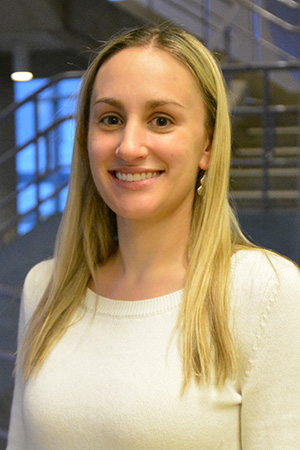
Jill Goldstein, PhD
Research Fellow at Harvard Department of Stem Cell and Regenerative Biology
Biography
Jill Goldstein is a stem cell biologist dedicated to understanding how our bodily tissues maintain and repair themselves throughout adulthood. The goal of her research is to identify therapeutically relevant ways to restore healthy function to tissues in the contexts of aging and disease. Jill is currently an NIH/NIA postdoctoral fellow in Dr. Amy Wagers’ lab at the Harvard Department of Stem Cell and Regenerative Biology, where she has generated novel mouse models to interrogate how blood-borne molecules regulate stem cell function within the skeletal muscle and bone marrow. Prior to joining the Wagers lab, Jill completed her Ph.D. in Dr. Valerie Horsley’s lab at Yale University where she identified novel mechanisms that regulate hair follicle stem cell activity during pregnancy and cancer. Outside of the lab, Jill volunteers as a mentor for the Harvard Graduate Women in Science (HGWISE) mentoring program and trains in Brazilian Jiu-Jitsu.

Scott Greenwald, PhD
Research Fellow at Massachusetts Eye and Ear Infirmary
Biography
Dr. Scott Greenwald is a research fellow in the Department of Ophthalmology at Harvard Medical School and a member of the Ocular Genomics Institute at the Massachusetts Eye and Ear Infirmary. He is currently developing a gene therapy for treating the NMNAT1 form of Leber Congenital Amaurosis, an inherited disease that causes irreversible blindness in young children, and investigating the cellular mechanisms underlying this condition. Scott graduated from the University of Pennsylvania with a degree in the biological basis of behavior before joining Second Sight Medical Products to research the perceptual effects of artificial retinal stimulation in patients with advanced retinitis pigmentosa. He then went on to study cone photoreceptor dysfunction associated with inherited retinal diseases at the University of Washington where he earned a PhD in neurobiology.

Jordan Lewandowski, PhD
Postdoctoral Fellow at Harvard University
Biography
Jordan Lewandowski is a developmental biologist who is interested in understanding how regions of the genome that are devoid of protein-coding genes can contribute to human development and disease. The goal of his research is to better understand how our non-coding genome contributes to the etiology of human disease and to provide opportunities for better therapies and/or disease prevention. He is currently a NIH postdoctoral fellow in Dr. John Rinn’s lab at Harvard’s Department of Stem Cell and Regenerative Biology, where Jordan has already established several new models to study the effects of the noncoding genome. Prior to joining the Rinn lab, Jordan earned his PhD in Dr. Steven Vokes’ lab at the University of Texas at Austin where his dissertation researched focused on determining how the noncoding genome contributes to congenital limb malformations.
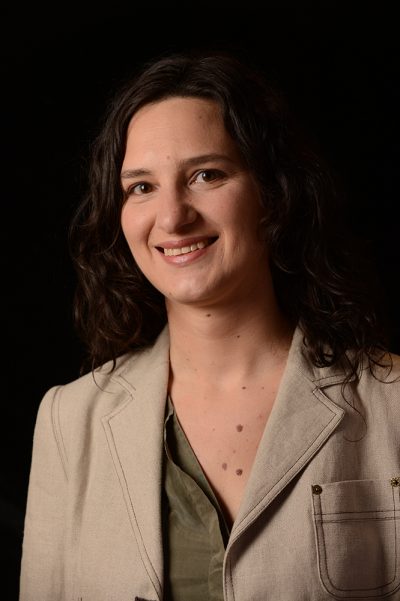
Cristina Lois Gomez, PhD
Postdoctoral Associate at Massachusetts Institute of Technology (MIT)
Biography
Cristina Lois holds an undergraduate degree in Physics and a PhD in Particle Physics from the University of Santiago de Compostela, Spain. The focus of her thesis was on detector development and instrumentation for the LHCb experiment at CERN.
After completing her PhD she was employed as a postdoctoral researcher at the Molecular Imaging and Translational Research Program at the University Of Tennessee Graduate School of Medicine, USA, within Prof. David Townsend’s group. During that time, she worked on PET/CT imaging, being responsible for the evaluation of a prototype Time-of-Flight (TOF)-PET/CT scanner in collaboration with Siemens. Together, they demonstrated for first time in a large patient population how TOF improves PET image quality and diagnostic accuracy.
In 2008, she earned a postdoctoral Fellowship to work at the University of Santiago de Compostela in collaboration with the Nuclear Medicine Department. There she worked on PET quantification, PET & SPECT instrumentation, as well as teaching courses for undergraduate and Master’s students. In 2009, she was awarded a public grant to build a preclinical SPECT system based on a clinical gamma camera. In 2011 she spent a semester as visiting scientist at the Imaging Science Institute Tübingen, Germany, working on PET/CT and PET/MR imaging, including topics like analysis of the effect of MR contrast agents on PET quantification, protocol optimization or dose reduction, among others.
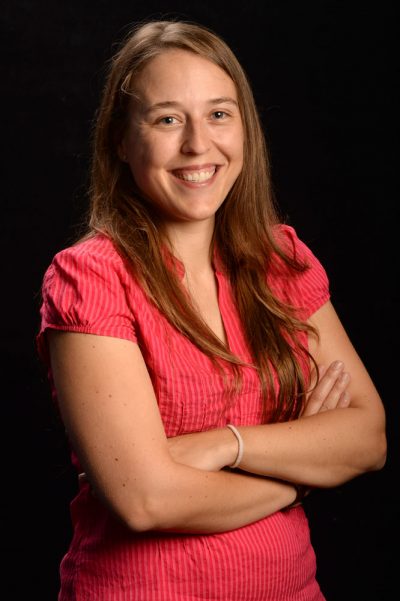
Berta Marti Fuster, PhD
Postdoctoral Associate at Massachusetts Institute of Technology (MIT)
Biography
Berta Martí Fuster is a biomedical imaging researcher from Spain. She holds a bachelor’s of science in physics, and a master’s of science in biomedical engineering from the University of Barcelona. Berta earned a PhD in biomedical engineering from the same university in 2013. Her doctoral work was fully funded by a fellowship from the Institute for Bioengineering of Catalonia (IBEC). Her thesis, “Image processing of emission tomography studies in refractory epilepsy,” aimed to develop and assess FocusDET, a new clinical platform for pre-surgical evaluation of emission tomography studies in refractory epilepsy.
From 2008-2009, Berta was a research technician for the Virtual Physiological Human Toolkit Project at the Biomedical Imaging Group at CIBER-BBN, the Biomedical Research Networking center in Bioengineering, Biomaterials and Nanomedicine.
Berta hopes that her work as a research scientist will contribute to the strengthening of Madrid’s position as a center of biomedical research. She also looks forward to learning from and working with global leaders in the biomedical sector, and to working to address unmet clinical needs.
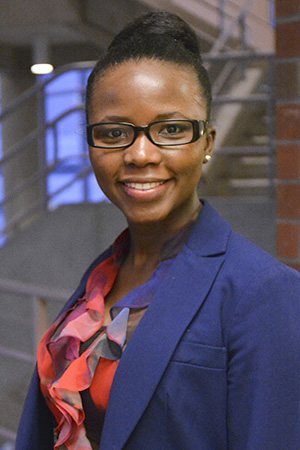
Samira Musah, PhD
Postdoctoral Associate at Harvard Medical School
Biography
Samira Musah is a Dean’s Postdoctoral Fellow at Harvard Medical School, a research fellow at the Wyss Institute for Biologically Inspired Engineering at Harvard University, and a nephrology research fellow at Beth Israel Deaconess Medical Center. Her research focuses on directed differentiation of human pluripotent stem cells to engineer functional conduits of human organs and develop in vitro disease models. Prior to her postdoctoral fellowship at Harvard University, Samira received her Bachelor of Science with honors in Chemistry from the State University of New York at Binghamton, and her Ph.D. in Chemistry with training at the Chemistry-Biology Interface from the University of Wisconsin―Madison. Samira’s long-term goal is to become an independent principal investigator at an academic setting where she hopes to establish a vigorous research program that links chemistry with stem cell biology and organ-level engineering to illuminate disease etiology and guide therapeutic discovery.

Bahar Rahsepar, PhD
Boston University
Biography
Bahar Rahsepar is a doctoral candidate in the Biomedical Engineering Department at Boston University. Her graduate research under supervision of Professor John A. White, is focused on the neural circuitry in the hippocampus responsible for formation and recall of episodic memories. Prior to BU, she did her undergraduate research on the mechanisms underlying effectiveness of Deep Brain Stimulation in treatment of temporal lobe epilepsy at Emory University in Dr. Robert Gross lab. She received bachelor of science in Biomedical Engineering from Georgia Institute of Technology in 2014. She is passionate about developing technology for novel diagnostics and treatments of mental disorders.
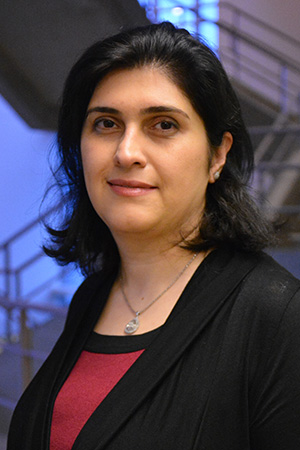
Leila Shokri, PhD
Postdoctoral Research Fellow at Brigham and Women’s Hospital
Biography
Leila Shokri is currently a postdoctoral research fellow in Dr. Martha Bulyk’s laboratory in the department of Medicine, Genetics division at Brigham and Women’s Hospital and Harvard medical school. Her research interest involves studying control and specificity in gene regulation of complex metazoans. Using high-throughput Y2H screen, she is currently mapping combinatorial interactions among nearly complete Drosophila TF repertoire. She received her Ph.D.in Physics from Northeastern University. Her PhD research was focused on understanding the mechanisms by which proteins engage DNA sequences and/or alter DNA structure in replication forks of unicellular organisms using single-molecule stretching techniques.

